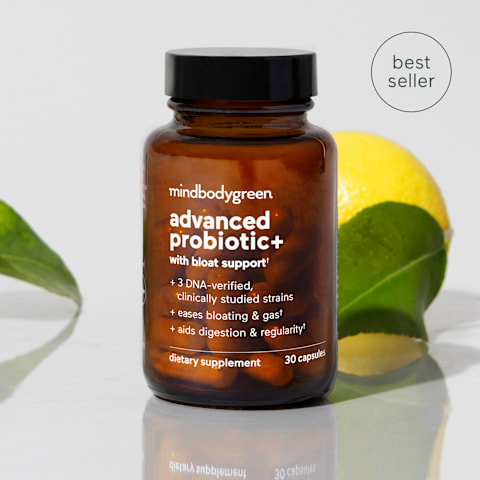Advertisement
Digestion & Acne: How To Get Clear Skin By Healing Your Gut

If you're working toward more radiant and glowing skin, you might be surprised to know that the answer lies more in your digestive tract rather than on how much you're spending on creams and cleansers. If we look a bit closer at how our digestive system works, it begins to make a lot of sense. Among other functions, our digestive system is the main place where we absorb nutrients from our foods. It's also the source of much of our body's inflammation, which can wreak havoc on the skin. If the digestive system isn't working optimally, breakouts, eczema, redness and dull skin can ensue.
Significant research even shows that many of these inflammatory skin conditions are certainly triggered by poor digestion: Since your skin is your body's largest organ, it's no surprise that acne, rosacea, and dermatitis crop up when something's off internally.
What Causes Poor Digestion?
Suboptimal digestion is quite common today, and is caused by numerous factors including:
- Eating a diet high in processed foods, refined carbohydrates and sugar
- Eating too many dairy products
- Eating foods to which you have sensitivities (gluten and eggs, for example)
- Consuming too much alcohol
- Living a high-stress lifestyle
- Not getting enough exercise
Top 6 Digestion Boosters for Beautiful Skin
Great skin can do wonders for your confidence. Plus, just knowing you are taking care of it can make you feel better about your skin long term. Incorporating these six daily tips into your routine, along side enough sleep, will help uncover your own radiant and glowing skin.
Of course, skin is a complicated organ, so even if you eat perfectly you may experience skin flare ups triggered by other concerns—that's OK, Just do your best to stick to these healthy digestion tips and you'll be in a much better place.
Ditch dairy, sugar, and gluten (at least temporarily)
Many people have food allergies, but even more have food sensitivities. Often skin conditions are influenced by sensitive foods; many people go for years without ever addressing the core problem. If there is one thing that you try in this list, this is it. These foods can lead to intestinal inflammation and affect your healthy gut flora and thus, overall digestion and skin.
Dairy has been linked to hormonal acne1; sugar (or foods that rank high on the glycemic index) has been linked to increasing inflammation throughout the body, resulting to breakouts, rashes, and flares; gluten (especially if you are sensitive) can damage your microflora2.
After three weeks, you can start to fold back in your favorite foods—one at a time—and see how your skin and body reacts. Some, you'll find, you'll be totally fine with having in your diet (or at least in moderation). Others, you'll be able to identify as potential triggers for flare-ups.
Take a daily probiotic
Support your gut flora by taking a daily probiotic supplement. These “good bacteria” live in our digestive tract and help keep our microbiome flourishing, allowing our bodies to absorb skin-benefiting nutrients and also help with the removal of wastes. You can also get these good probiotics in raw sauerkraut and kombucha.
Supplement with raw apple cider vinegar
Raw apple cider vinegar (or commonly referred to as just "ACV") can help as a digestive aid if used thoughtfully. This tonic is good for a host of functions in the body, including, the promotion of optimal digestion and helping those friendly bacteria grow in the body.
When you purchase ACV, look for “raw” and “unfiltered.” (Ideally, you'd buy a label that says “with the mother,” so you can gain all the benefits). You can add ACV to your salad dressings or even take a tablespoon mixed with water to get the benefits. However, do not take ACV straight, as its acidity can be equally has hard on your body.
Take digestive enzymes
Your body makes its own digestive enzymes, but often times our bodies do not make enough to break down everything we consume, especially as we age. Supplementing with digestive enzymes is beneficial for the absorption of all the nutrients necessary for beautiful skin. By helping to promote efficient digestion, digestive enzymes help the body renew damaged cells while also decrease constipation – a key for glowing skin. Look for plant-based enzymes to avoid contaminants from non-organic animal-based enzymes.
Eat a whole foods, plant-based diet
What you put in your body is arguably more important for your skin than what you put on it. Eating a whole food based diet, rich in vegetables and fruits (thanks to their antioxidant properties), is the best way to promote your digestive tract and skin on the path to wellness. Supplementing your diet with nuts, seeds, whole grains (such as quinoa, millet and amaranth) as well as legumes is great.
Move your body every day
While you shouldn’t exercise on a full stomach, movement is essential to your digestive system’s function. By increasing your heart rate once per day you are helping circulate nutrients to your skin.3 Further, certain stretches and yoga postures (such as seated spinal twists) can help promote elimination. Exercise also helps lower your stress levels, leading to healthier, younger looking skin.

